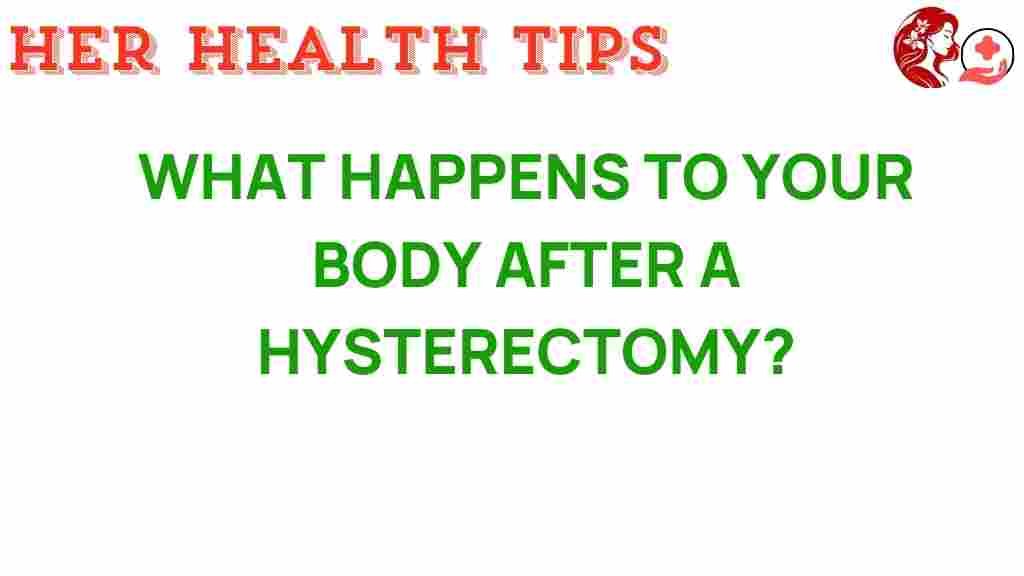Hysterectomy: What Happens to Your Body After This Surgical Procedure?
A hysterectomy is a significant surgical procedure that involves the removal of a woman’s uterus. It is often performed to treat various medical conditions, such as fibroids, endometriosis, and certain types of cancer. Understanding the aftermath of this operation is crucial for women considering or recovering from this surgery. In this article, we will unveil the truth about what happens to your body after a hysterectomy, focusing on recovery, hormonal changes, and the emotional and physical impacts on women’s health.
The Hysterectomy Procedure: What to Expect
The hysterectomy can be performed through various methods, including abdominal, vaginal, or laparoscopic techniques. Each method has its own recovery timeline and implications for long-term health.
- Abdominal Hysterectomy: Involves a larger incision in the abdomen and may require a longer recovery time.
- Vaginal Hysterectomy: Performed through the vaginal canal, typically resulting in a shorter recovery period.
- Laparoscopic Hysterectomy: Minimally invasive, using small incisions and a camera, leading to quicker recovery times.
Regardless of the method chosen, a thorough understanding of the recovery process is essential.
Recovery After a Hysterectomy
Recovery is a critical phase after undergoing a hysterectomy. It generally involves both physical healing and emotional adjustment. Here’s what you can expect:
- Initial Recovery: The first few days post-surgery involve rest and pain management. Hospital stays may range from one to three days, depending on the surgical method and individual health.
- At Home Care: Following discharge, women are advised to limit strenuous activities, avoid heavy lifting, and follow a prescribed pain management plan.
- Follow-Up Appointments: Regular check-ups with your healthcare provider are necessary to ensure proper healing and address any concerns.
Understanding Hormonal Changes
One of the most significant impacts of a hysterectomy is the hormonal changes that occur, especially if the ovaries are removed (oophorectomy). Here’s how these changes can affect your body:
- Menopause: If the ovaries are removed, women will enter menopause immediately, experiencing symptoms such as hot flashes, night sweats, and mood swings.
- Hormone Replacement Therapy (HRT): Some women may choose to undergo HRT to alleviate menopausal symptoms. Discussing the risks and benefits with a healthcare professional is crucial.
Emotional Impact of a Hysterectomy
The emotional aftermath of a hysterectomy can be profound. Many women experience a range of feelings, from relief to sadness, and it’s essential to acknowledge these emotions:
- Relief: For some, a hysterectomy brings relief from chronic pain or heavy menstrual bleeding.
- Grief and Loss: The removal of the uterus can lead to feelings of loss, especially for those who wanted to bear children.
- Anxiety and Depression: Hormonal changes and life adjustments can trigger anxiety and depressive symptoms.
Seeking support from friends, family, or mental health professionals can be beneficial during this transition.
Physical Health Considerations
Post-operative care is vital for ensuring your physical health after a hysterectomy. Here are some key considerations:
- Manage Pain: Utilize prescribed medications to control post-operative pain effectively.
- Maintain a Healthy Diet: A balanced diet rich in fruits, vegetables, and whole grains can aid recovery and overall health.
- Engage in Light Activity: Gradually introduce light physical activity, such as walking, to improve circulation and promote healing.
- Watch for Complications: Be vigilant for signs of infection, excessive bleeding, or unusual pain, and contact your healthcare provider if they arise.
Long-Term Effects of a Hysterectomy
Understanding the long-term effects of a hysterectomy is essential for ongoing women’s health. These may include:
- Bone Health: The removal of ovaries can lead to decreased estrogen levels, increasing the risk of osteoporosis.
- Cardiovascular Health: Women may experience a higher risk of heart disease post-hysterectomy due to hormonal changes.
- Pelvic Floor Health: Some women may face pelvic floor issues, such as prolapse, which may require additional treatment.
Post-Operative Care Tips
Effective post-operative care can significantly impact recovery and long-term health. Here are some essential tips:
- Follow Medical Advice: Adhere strictly to your healthcare provider’s instructions regarding medication, activities, and follow-up appointments.
- Emotional Support: Engage in support groups or counseling to address emotional changes and foster resilience.
- Regular Check-Ups: Schedule annual gynecological exams and discuss any concerns with your healthcare provider.
Troubleshooting Common Concerns
While the recovery process is generally smooth, some women may experience complications. Here are some troubleshooting tips:
- Persistent Pain: If pain does not improve or worsens, consult your doctor to rule out complications.
- Excessive Bleeding: Contact your healthcare provider immediately if you experience heavy bleeding.
- Emotional Distress: Don’t hesitate to seek help from a mental health professional if you’re struggling to cope emotionally.
Conclusion: Embracing a New Chapter in Women’s Health
A hysterectomy can be a life-changing surgical procedure with various implications for recovery, hormonal balance, emotional health, and physical well-being. Understanding what happens to your body after a hysterectomy is vital for navigating this transition. By taking proactive steps in post-operative care and seeking support, women can embrace this new chapter in their lives with confidence.
For more information on women’s health and recovery resources, consider visiting Women’s Health Network.
Additionally, for those looking for support groups, check out Hysterectomy Support Forums to connect with others who have undergone similar experiences.
This article is in the category Reproductive and created by HerHealthTips Team

2 thoughts on “Unveiling the Truth: What Happens to Your Body After a Hysterectomy?”